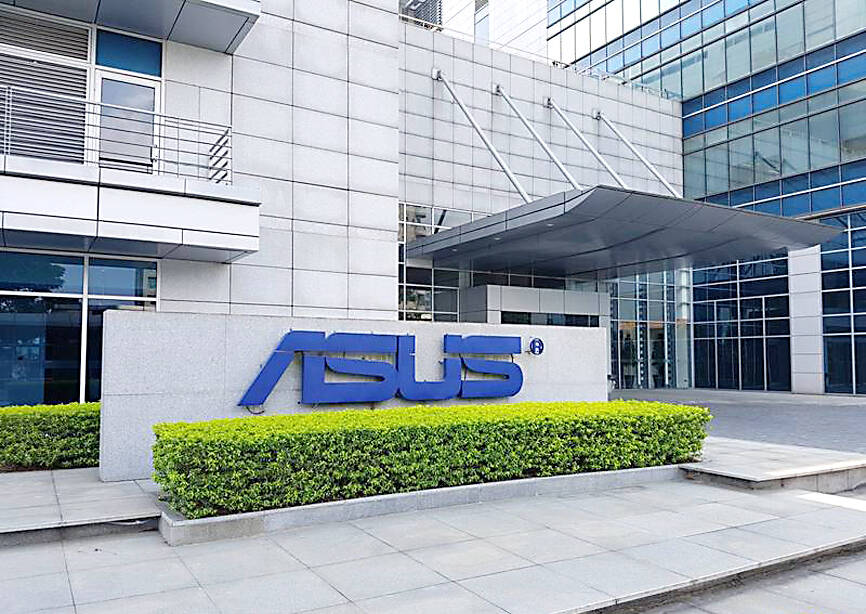PC vendor Asustek Computer Inc (華碩電腦) yesterday reported NT$2.59 billion (US$81.45 million) in net profit for last quarter, snapping two consecutive quarters of losses as gross margin improved and nonoperating gains improved significantly.
The company lost NT$1.68 billion in the first quarter this year. On an annual basis, net profit expanded 36 percent from NT$1.9 billion.
Earnings per share rose to NT$3.5 last month, reversing losses per share of NT$2.3 in the first quarter and NT$2.6 in July last year.

Photo: Fang Wei-chieh, Taipei Times
Gross margin improved to 12.5 percent last quarter from 8.1 percent a quarter earlier and 12.2 percent a year earlier, Asustek said.
The company booked NT$1.2 billion in nonoperating income last quarter.
“Asustek has emerged from an adjustment period,” Asustek chief financial officer Nick Wu (吳長榮) told investors in an online conference. “The company’s operations are entering a normal profit-making period.”
“We are looking at stable growth in the second half and a greater advancement in 2024,” Wu said.
Asustek said that it expects PC revenue to grow 20 percent sequentially this quarter, fueled by rising demand for gaming PCs and consumer notebook computers during the industry’s peak season.
Moreover, PC channel inventory has improved to a healthy level, it said.
Revenue from electronic components such as motherboards is expected to expand 10 percent quarter-on-quarter, the company said.
“The market demand is gradually recovering, but the pace is slower than we expected,” Asustek cochief executive officer S.Y. Hsu (許先越) said. “We are expecting to see a continuous improvement in revenue and profit in the second half compared with the second quarter. We are seeing a positive trend.”
To cope with the seasonal pickup, Asustek kept its inventory unchanged at NT$117.52 billion last quarter, a significant improvement of 43 percent from NT$206.17 billion a year earlier.
Asustek aims to accelerate growth of its new businesses, including commercial notebook computers and servers.
The company said it is targeting compound growth of its commercial notebook computer business of 15 percent in the five years to 2027.
Its server business is expected to grow even faster, at an annual compound rate of 40 percent for this year to 2027, it said.
Its server business currently contributes a low-single-digit percentage to the company’s revenue, it said.
Asustek recently joined local rivals including Quanta Cloud Technology (雲達科技) and Gigabyte Technology Co (技嘉) to become a supplier of servers equipped with Nvidia Inc’s latest artificial intelligence graphics processing units.
Commenting on rules in India to restrict PC imports, Asustek co-chief executive officer Samson Hu (胡書賓) said that the effect of the regulations should be minimal, as the firm has been working with its partners to produce notebook and desktop computers in India.
India is an important market for the company, with Asustek ranked No. 2 in the country’s notebook computer market.
Asustek’s revenue last quarter rose 5 percent from a quarter earlier, but was down 7 percent from the second quarter last year at NT$107.40 billion.
About 64 percent of the revenue was from PCs.

PERSISTENT RUMORS: Nvidia’s CEO said the firm is not in talks to sell AI chips to China, but he would welcome a change in US policy barring the activity Nvidia Corp CEO Jensen Huang (黃仁勳) said his company is not in discussions to sell its Blackwell artificial intelligence (AI) chips to Chinese firms, waving off speculation it is trying to engineer a return to the world’s largest semiconductor market. Huang, who arrived in Taiwan yesterday ahead of meetings with longtime partner Taiwan Semiconductor Manufacturing Co (TSMC, 台積電), took the opportunity to clarify recent comments about the US-China AI race. The Nvidia head caused a stir in an interview this week with the Financial Times, in which he was quoted as saying “China will win” the AI race. Huang yesterday said

Nissan Motor Co has agreed to sell its global headquarters in Yokohama for ¥97 billion (US$630 million) to a group sponsored by Taiwanese autoparts maker Minth Group (敏實集團), as the struggling automaker seeks to shore up its financial position. The acquisition is led by a special purchase company managed by KJR Management Ltd, a Japanese real-estate unit of private equity giant KKR & Co, people familiar with the matter said. KJR said it would act as asset manager together with Mizuho Real Estate Management Co. Nissan is undergoing a broad cost-cutting campaign by eliminating jobs and shuttering plants as it grapples

The Chinese government has issued guidance requiring new data center projects that have received any state funds to only use domestically made artificial intelligence (AI) chips, two sources familiar with the matter told Reuters. In recent weeks, Chinese regulatory authorities have ordered such data centers that are less than 30 percent complete to remove all installed foreign chips, or cancel plans to purchase them, while projects in a more advanced stage would be decided on a case-by-case basis, the sources said. The move could represent one of China’s most aggressive steps yet to eliminate foreign technology from its critical infrastructure amid a

MORE WEIGHT: The national weighting was raised in one index while holding steady in two others, while several companies rose or fell in prominence MSCI Inc, a global index provider, has raised Taiwan’s weighting in one of its major indices and left the country’s weighting unchanged in two other indices after a regular index review. In a statement released on Thursday, MSCI said it has upgraded Taiwan’s weighting in the MSCI All-Country World Index by 0.02 percentage points to 2.25 percent, while maintaining the weighting in the MSCI Emerging Markets Index, the most closely watched by foreign institutional investors, at 20.46 percent. Additionally, the index provider has left Taiwan’s weighting in the MSCI All-Country Asia ex-Japan Index unchanged at 23.15 percent. The latest index adjustments are to